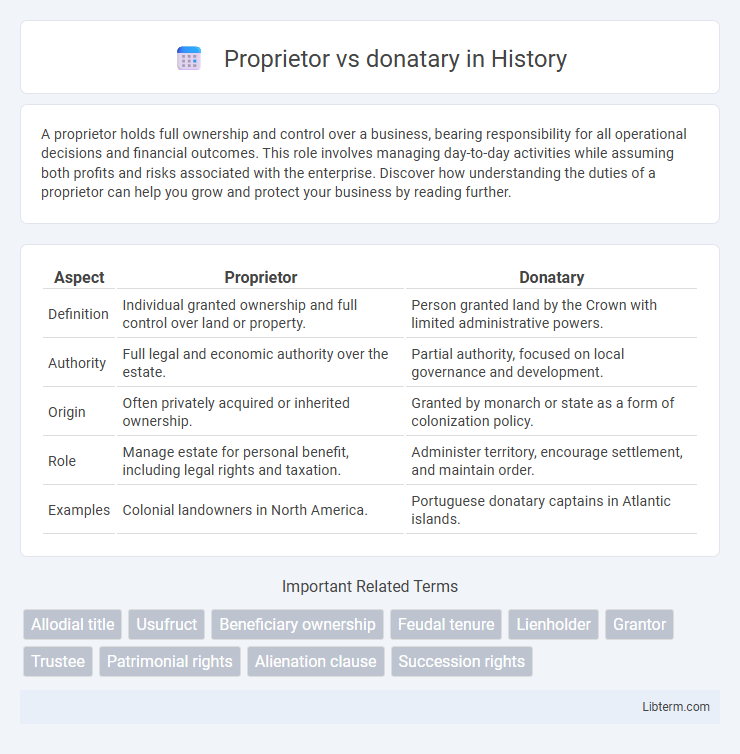A proprietor holds full ownership and control over a business, bearing responsibility for all operational decisions and financial outcomes. This role involves managing day-to-day activities while assuming both profits and risks associated with the enterprise. Discover how understanding the duties of a proprietor can help you grow and protect your business by reading further.
Table of Comparison
| Aspect | Proprietor | Donatary |
|---|---|---|
| Definition | Individual granted ownership and full control over land or property. | Person granted land by the Crown with limited administrative powers. |
| Authority | Full legal and economic authority over the estate. | Partial authority, focused on local governance and development. |
| Origin | Often privately acquired or inherited ownership. | Granted by monarch or state as a form of colonization policy. |
| Role | Manage estate for personal benefit, including legal rights and taxation. | Administer territory, encourage settlement, and maintain order. |
| Examples | Colonial landowners in North America. | Portuguese donatary captains in Atlantic islands. |
Understanding Proprietor and Donatary: Definitions
A proprietor is an individual or entity granted ownership rights over a property or business, often with full control and responsibility for its management. A donatary refers specifically to a person who receives a land grant or estate from a monarch or government, typically involving certain obligations or administrative duties attached to the land. Understanding the distinctions highlights the proprietor's emphasis on ownership and control, while the donatary holds rights tied to a formal grant and associated responsibilities.
Historical Origins of Proprietorship and Donatary Systems
The historical origins of proprietorship and donatary systems trace back to colonial era governance frameworks, where proprietorship referred to land or business ownership granted by a sovereign or state, typically seen in English colonies. Donatary systems emerged primarily within the Portuguese Empire, whereby donatary captains received large land grants (capitanias) to administer, settle, and develop territories in exchange for loyalty and military support. These distinct systems reflect differing colonial strategies for territorial control, economic exploitation, and governance in the 15th and 16th centuries.
Legal Framework: Proprietor vs Donatary
The legal framework governing proprietors and donataries defines proprietary rights and obligations within feudal and colonial land grants. Proprietors hold comprehensive ownership rights, including full control, transferability, and revenue collection, whereas donataries typically receive delegated powers under sovereign authority, with limited autonomy and responsibilities tied to settlement and administration. Distinctions in legal status impact jurisdiction, inheritance, and the extent of governmental oversight, shaping land tenure systems and colonial governance.
Main Roles and Responsibilities
Proprietors hold legal ownership of a property or business, responsible for managing assets, overseeing operations, and ensuring compliance with regulations. Donataries, often linked to land grants or trusts, primarily receive and manage property rights or donations, focusing on stewardship and fulfilling specific conditions tied to the gift. Proprietors exercise broader control and decision-making power, while donataries are duty-bound to preserve and utilize the property according to the grantor's intent.
Key Differences Between Proprietor and Donatary
A proprietor holds ownership and full control over property or business assets, often acquired through purchase or inheritance, while a donatary receives rights or property as a donation, typically from a sovereign or governing body, with specific obligations attached. Proprietors exercise broad legal and financial authority, whereas donataries may face conditions limiting their use or transfer of the granted property. The key difference lies in the origin of ownership--proprietorship is based on private acquisition, and donatary status is granted for administrative or colonial purposes under a formal grant system.
Advantages and Disadvantages
A proprietor holds full ownership and control over property or business, allowing for flexible decision-making and direct profit retention, though bearing unlimited liability and financial risk. A donatary receives land or rights as a grant, often from the government or monarch, benefiting from limited financial investment and potential tax exemptions, but facing restrictions on autonomy and possible obligations to fulfill specific conditions. Proprietorship offers entrepreneurial freedom but increased responsibility, while donatary status provides security and support with limited independence.
Impact on Property Rights and Ownership
Proprietors hold legal title to property with full ownership rights, enabling them to sell, lease, or transfer property at their discretion, reflecting clear and enforceable property rights. Donataries typically receive property through grants or donations, often subject to specific conditions or limitations imposed by the grantor, which can restrict their full ownership powers. This distinction impacts property rights significantly, as proprietors enjoy absolute ownership, while donataries have conditional rights that may influence control, use, and transferability of the property.
Practical Examples in Modern Contexts
A proprietor typically owns and manages a business or property, evidenced by small business owners who hold full responsibility for operations and liabilities, such as independent retail store owners. Donataries, historically land grantees with rights to govern and develop territory, find modern parallels in sovereign land trusts or indigenous groups managing autonomous regions with delegated governmental powers. These distinctions reflect differences in control scope and legal authority, influencing property rights and governance in contemporary legal frameworks.
Common Misconceptions
Proprietors are often mistaken for donataries, but proprietors hold full ownership rights and responsibilities over properties or businesses, whereas donataries typically receive assets or territories through donation with specific limitations. Misconceptions arise from confusing the extent of control and legal obligations, as proprietors exercise autonomous authority while donataries function under the donor's conditions or crown mandates. Clarifying these distinctions is crucial in legal and historical contexts to avoid errors in property rights interpretation and governance.
Choosing Between Proprietor and Donatary: Factors to Consider
Choosing between a proprietor and a donatary depends on the extent of control and responsibility desired over a territory or property. Proprietors typically hold full ownership rights with the ability to enforce laws and manage resources, while donataries function under broader sovereign authority with restricted powers and obligations to promote settlement and development. Factors such as legal jurisdiction, autonomy level, and obligations to the crown or government must be carefully evaluated to determine the most suitable role.
Proprietor Infographic

 libterm.com
libterm.com